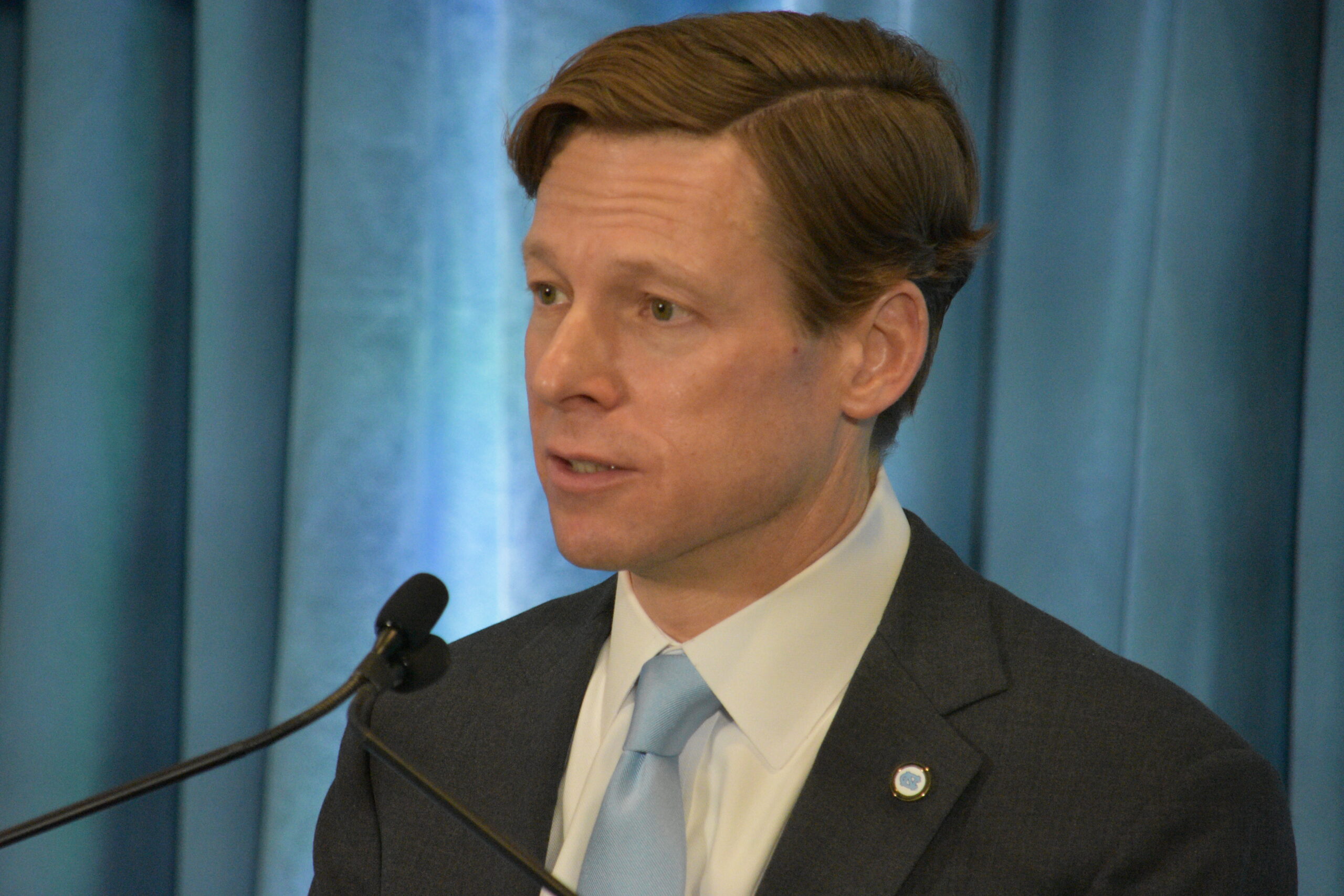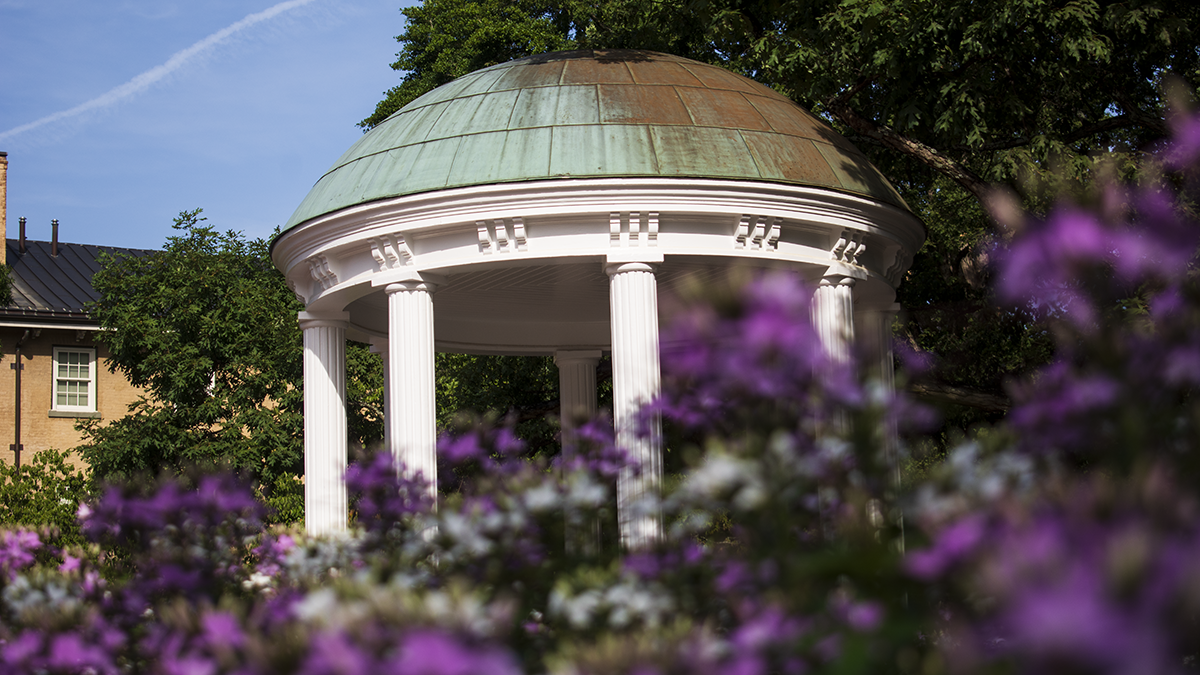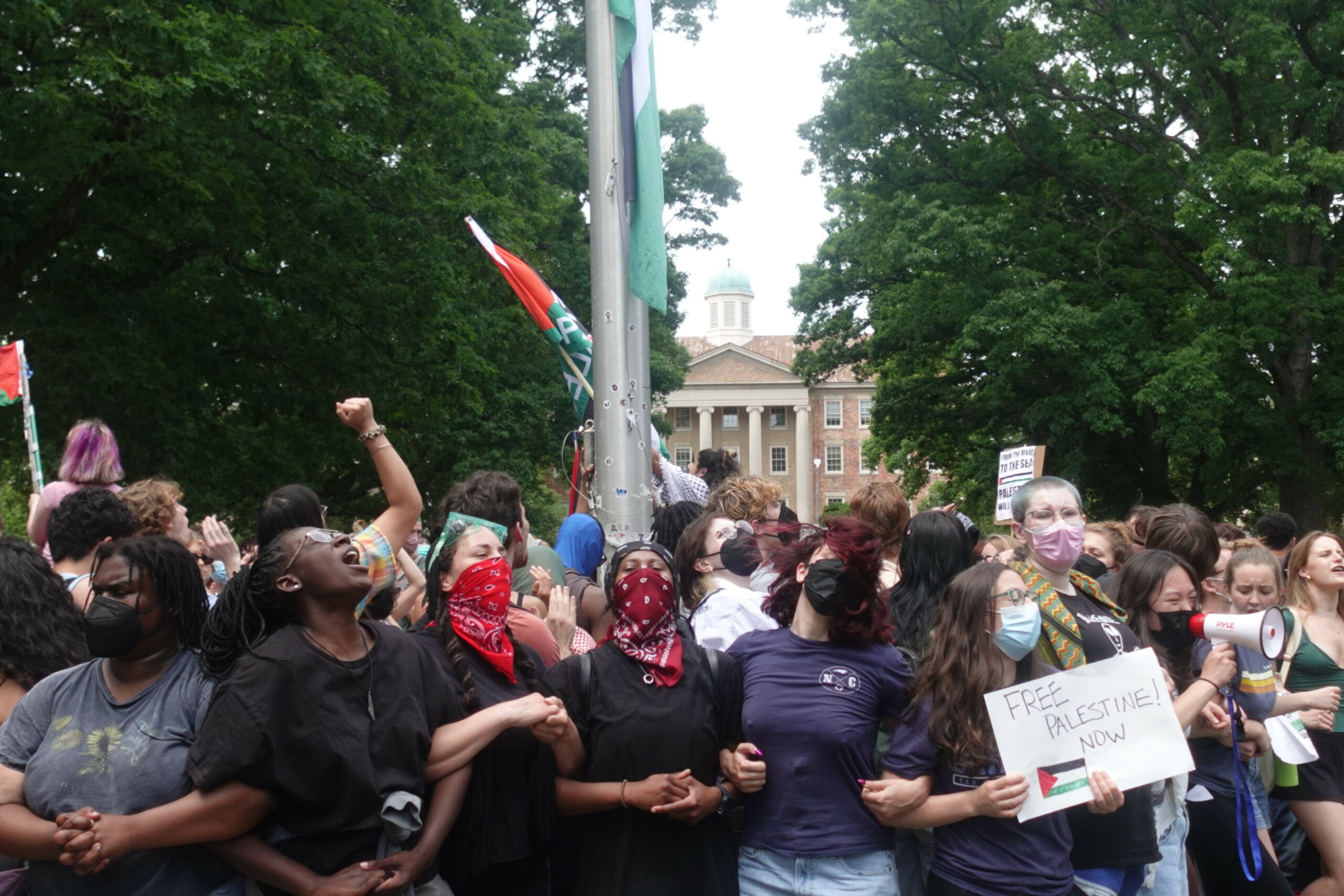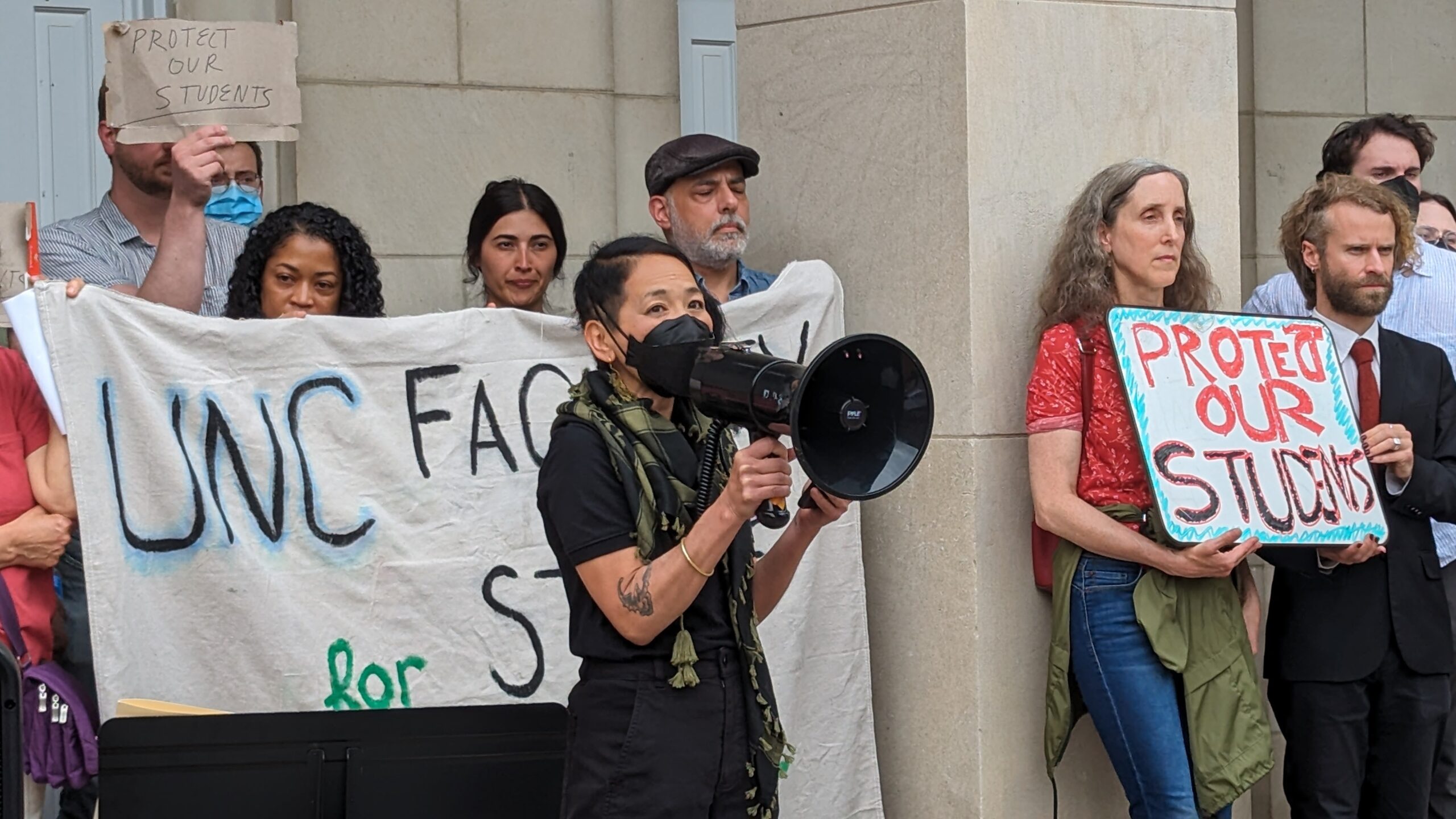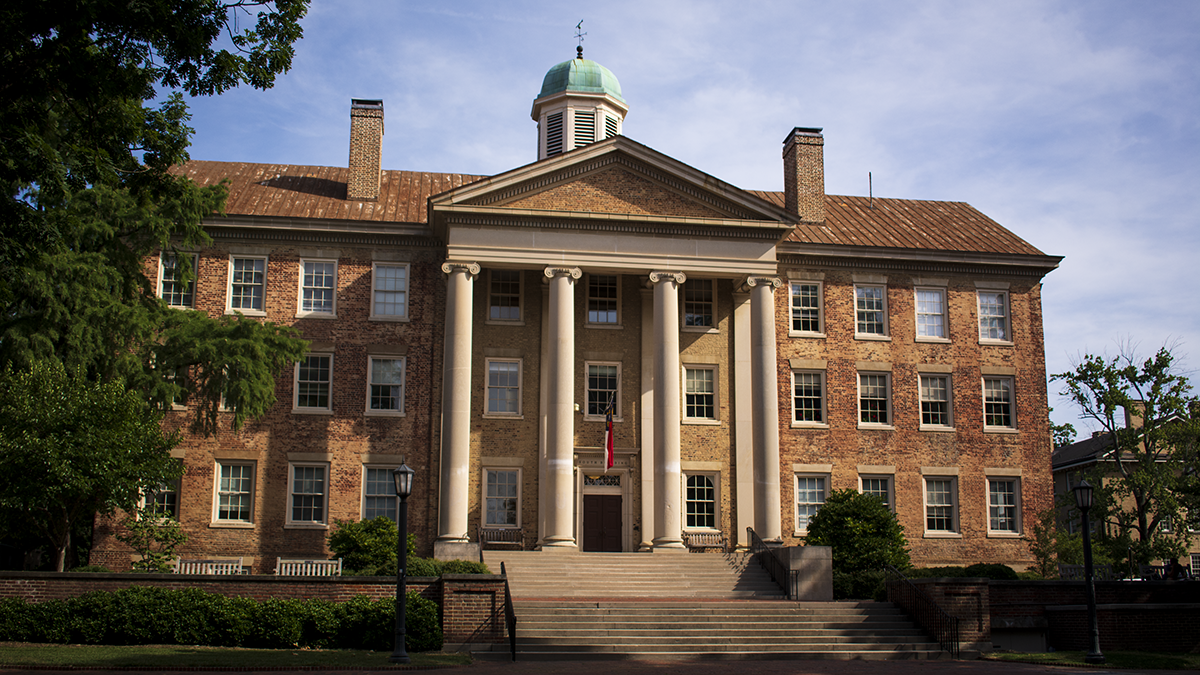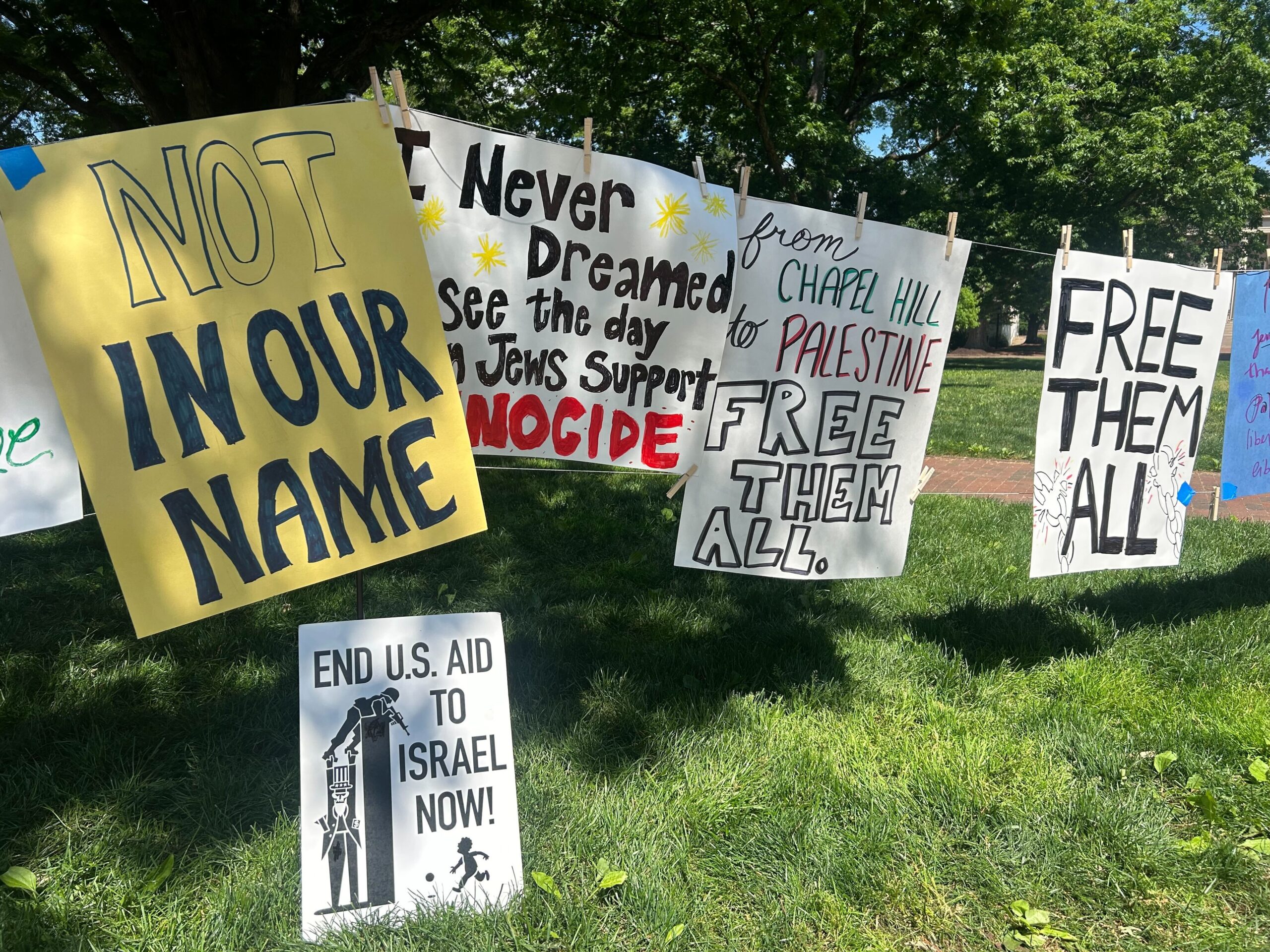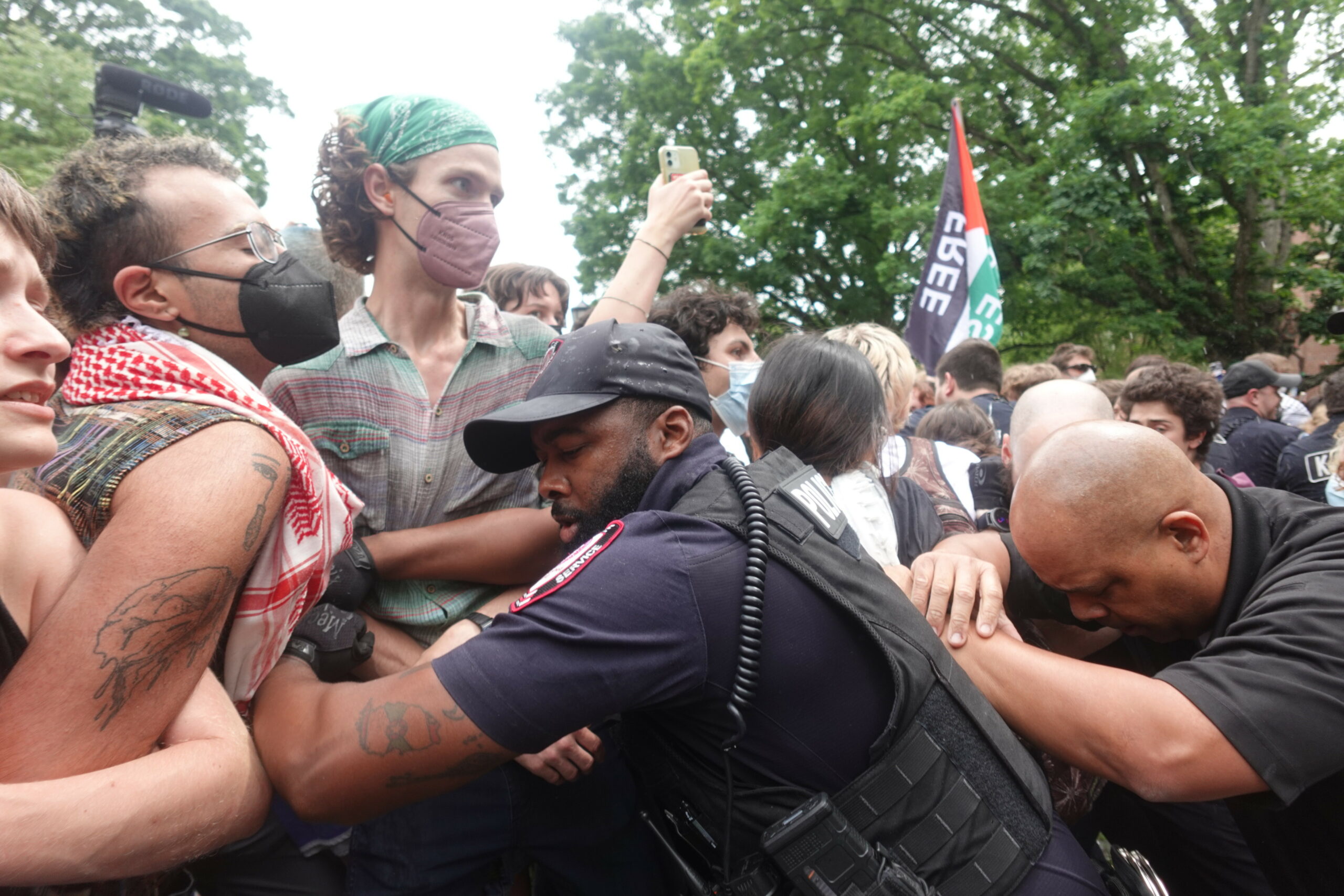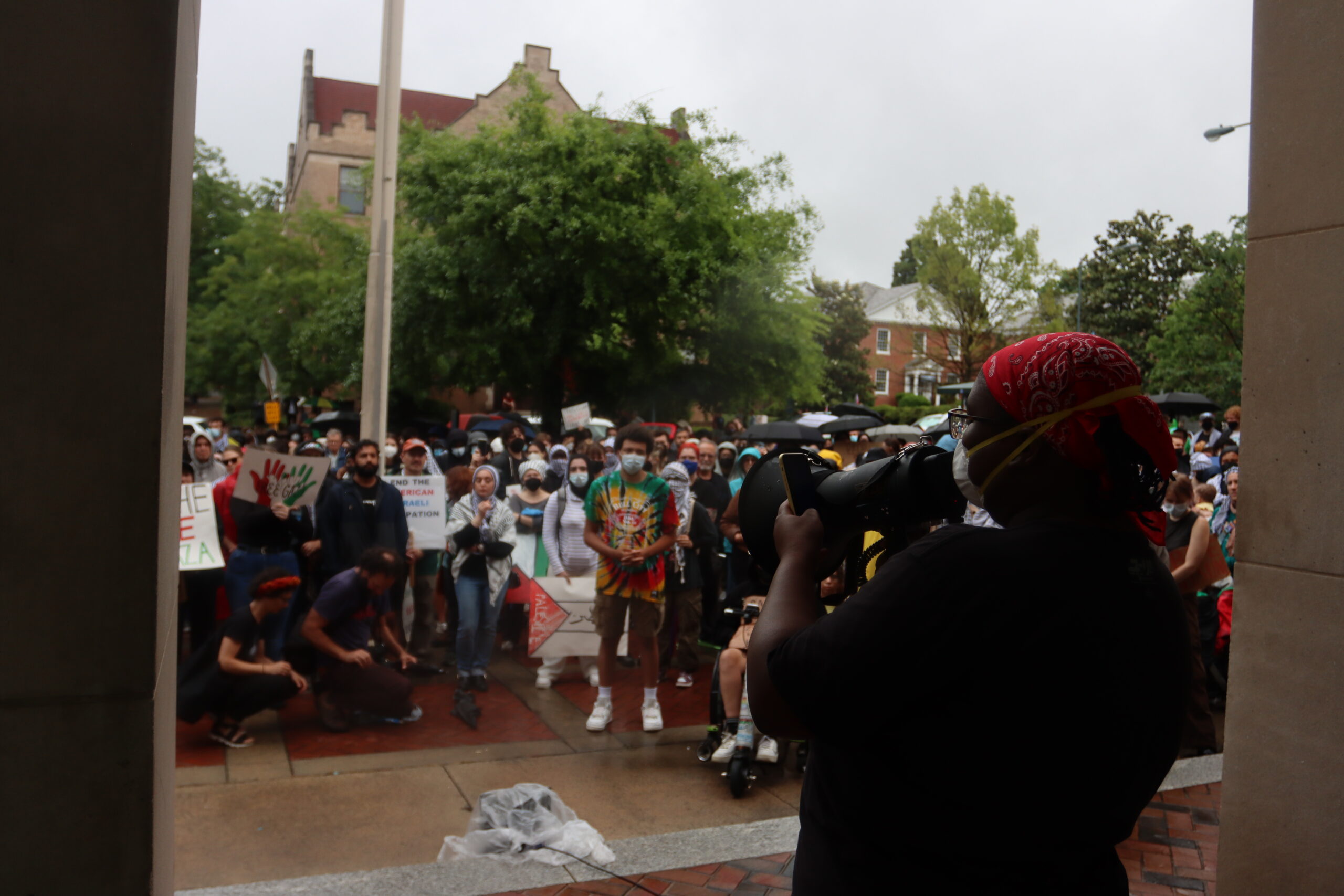The academic year is over at UNC, but tensions remain high after several weeks of contentious demonstrations against the war in Gaza – including a tent encampment that drew a forceful response from campus police.
The tent encampment went up near the end of April and lasted for several days, but UNC police broke it up on the morning of April 30, citing violations of campus rules. (Most notably, the university’s facilities office said “structures” like tents were not allowed.) Tensions escalated after that police action, though – culminating in a standoff that afternoon where some protestors removed a U.S. flag from a pole and replaced it with a Palestinian flag.
In the aftermath of that incident, UNC shut down the Campus Y building for the rest of the week. Officials cited “safety reasons” for the closure, but Campus Y leaders claimed it was an act of retaliation against the student-run social justice group for having supported the protests – and that had some faculty members sounding the alarm about a threat to academic freedom. When UNC reopened the Campus Y building, they did so only with limited hours – but pro-Palestinian protestors have also staged multiple demonstrations on campus in the weeks since April 30, with no strong police response.
A statement from university leaders defended the UNC Police for their response to the protest. Among other things, the statement referenced several disturbing incidents of antisemitism on campus, most notably an arson threat against a Jewish fraternity; that’s part of a nationwide spike in antisemitic incidents over the last few months.
UNC’s statement drew some pushback, though – not because of the references to antisemitism, but because it justified that morning’s action by citing events that happened afterward, like the afternoon’s flagpole incident.
Amidst all of those concerns, UNC Interim Chancellor Lee Roberts stopped by 97.9 The Hill last week for a wide-ranging conversation with Aaron Keck.
Click here to listen to their full discussion, which also included a look ahead at the May 12 commencement ceremony. The transcript below has been lightly edited for clarity.
Aaron Keck: Let’s go back to Tuesday, April 30. Two different events: there was the one in the afternoon, where police had to go back in, but I want to ask about the initial decision to shut down the encampment on Tuesday morning – because the statement that went out, defending that decision, referenced a lot of things that happened afterwards. So, walk me through the decision to go in on Tuesday morning. What was the thought process there?
Lee Roberts: You know, at Carolina, not only are we bound, as a matter of constitutional law, to support free speech, we have a long and noble tradition, as the nation’s first public university, of supporting not just free speech, but peaceful protest. We encourage student activism and engagement. We have some very simple, not particularly stringent rules. You can’t camp on the quad. You can hang out on the quad all you want, but you can’t turn it into your private campground. And you can’t take down the American flag and put up another flag.
So when the encampments started the previous Friday, the protestors were very much aware of the rules, very cooperative with our Student Affairs folks. There was a really good dialogue between Student Affairs, the administration, and the protestors, and whenever there was a concern about the rules being followed, the protestors complied. That all changed on Sunday afternoon. I’m not sure exactly why, but they stopped cooperating with us. They stopped talking to us, and they started doing things that they knew were violations of – again, these not-particularly-stringent, not-particularly-complicated rules. And these are rules they’d been complying with for days. So I don’t think anyone was confused about what they were doing.
So we started warning them that there would be consequences for breaking the rules. We did that over the course of about a day and a half. And then when it came time to enforce the rules, nobody got arrested who didn’t want to be arrested. You could easily walk away. On video, you (can) see dozens of students walking away from the police.
My kids are 23, 21 and 18. I don’t want to see college students get arrested. Nobody who works at Carolina, or I think any other university in the country, wants to see college students getting arrested. In this case, we felt as though we had been left with no choice. And again, no one got arrested who didn’t want to get arrested. (And only) 13 of the 36 people who got arrested were Carolina students.
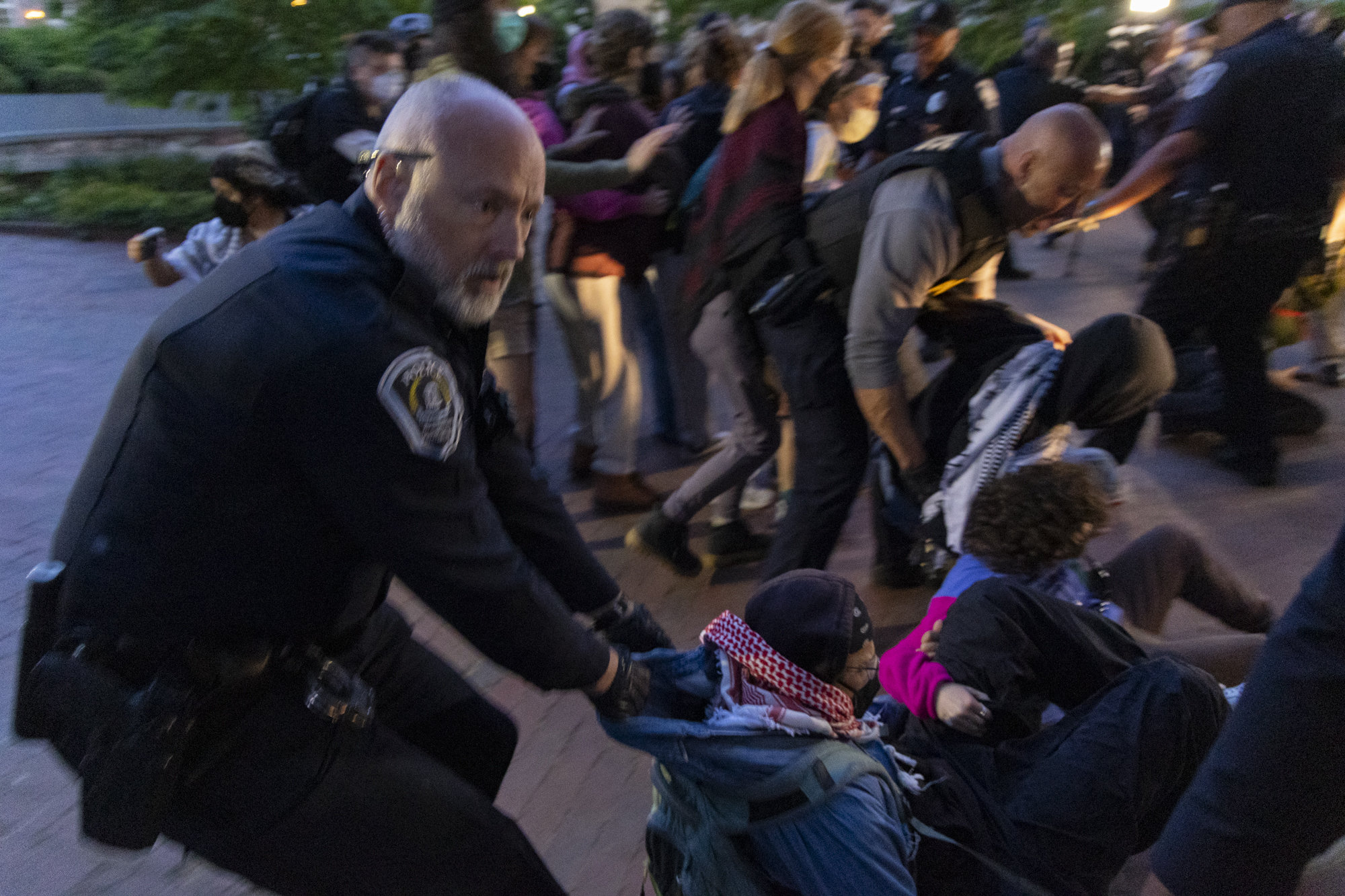
UNC Police officers drag students away to clear the pathway for the police carts in Chapel Hill, N.C. on Tuesday, April 30, 2024. The carts contain students who have been arrested for trespassing on campus grounds due to the solidarity encampment. (Photo via Jennifer Tran.)
Keck: To what extent did you consider the possibility that (the police action) on Tuesday morning would escalate rather than deescalate tensions? How much did that factor in?
Roberts: You know, I obviously wish that hadn’t happened. I had hoped that the protestors would disperse. I think we all did. That’s what we had asked them to do. They decided to go the other way.
Keck: I’ve seen a lot of campus protests. It happens so often that the police (take action) and then there’s an escalation. And it just – it seemed to me, sitting here, just eminently predictable that what happened on Tuesday morning was going to lead to what happened on Tuesday afternoon.
Roberts: You know, if the protestors had continued following the rules, there wouldn’t have been any escalation at all. I think it was pretty clear to everyone that they were the ones who had decided to force a confrontation.
Look, this whole issue – there’s nothing new about this. We’ve had pro-Palestinian protests on campus since, I believe, October 8th, the day after the Hamas attacks. And those protests have been entirely peaceful, largely rule abiding. And there have been not only no arrests, there’s been the support of the university community, for peaceful protest around a range of issues. If we were hellbent on cracking down on dissent, that obviously wouldn’t be the case. Since April 30th, we’ve had multiple peaceful protests on this same issue, which are entirely supported by the university. You can march up and down the quad, and wave flags, and assemble at South Building, and make speeches, and you can hang out on the quad. Again, some very simple basic rules that the protestors had abided by and clearly made a decision to stop abiding by.
Keck: I’m fascinated to ask you this question, because I love American history and I know you know your history. There’s obviously a lot of parallel between what’s happening now – not just at UNC, but nationwide – and the anti-Vietnam protests of the 1960s and 70s: the same strategies, encampments, occupying buildings, and so on. We’ve now got 60 years of hindsight, and history’s had a chance to judge how colleges responded (to those protests). To what extent do you use that as a guide?
Roberts: My father is a newspaper reporter, career journalist, and he was covering the campus protests in the 60s and 70s in California, which is where they all started. He was the New York Times Bureau chief in Los Angeles. And I’ve talked with him about it quite a bit, and he’s pretty clear in his view that the parallels are overblown. I (agree) that the parallels are strained: among other things, (in) the Vietnam era, students were being drafted and sent directly into the conflict. And many colleges had ROTC units that were training students to become officers and be sent into combat. There’s nothing like that parallel here.
I’d also say I was in college in the late 1980s, (at) the height of the anti-apartheid divestment movement. I know a lot of people analogize to that as well, (but) in that case, university endowments were directly invested in many cases in South African mining companies that were clearly in partnership with the South African government. And I think there was a broad consensus, of course, that apartheid was wrong, and (efforts) to bring about the end of apartheid were justified. So two important differences between that and the situation we have now: there’s clearly no consensus that Israel has to be punished and that companies should divest, there’s at least as many people on the other side – in fact, polling would tell you that even among young people, there’s many more people on the other side. Moreover, the divestment request is in contrast to the situation with South Africa. (Today’s) divestment request, as best as I can understand, is to identify multinational companies that do business in 200 countries around the world, one of which happens to be Israel, and asking for divestment in that context. I think that’s very different.
Keck: (We’ve seen) a rise in antisemitic activity. In a larger sense, what can the university do, not just to combat antisemitism, but to prevent it before it starts?
Roberts: It is very troubling, and I know some people have tried to deny that there’s any connection between these very active pro-Palestinian protests and the clear rise in antisemitism. I think that’s a stretch. It seems clear, at least to me, that there is a connection. And we’ve seen a troubling rise in reported documented antisemitic incidents on our campus. We had a threat of arson against the Jewish fraternity. We had the slogan that is written at the gates of Auschwitz, written on a whiteboard. We’ve had swastikas and antisemitic slurs written on Jewish students’ dorm room doors. And that’s just completely unacceptable, by anyone’s definition of what an environment of learning should be.
In terms of preventing it, I obviously don’t have all the answers, but I think hopefully education can make a difference and hopefully making clear to our broader community that the Jewish community is supported on campus and is seen and heard. That has to be critical and that’s true for all communities. So my first day on the job, I went to a Friday night meal at Hillel. I’ve been to Chabad, I’ve been to an iftar dinner during Ramadan with Muslim students. I think the more that we can all do to try to encourage cross-cultural understanding – and Carolina is well placed to do this – the better off we’ll be.
Keck: There have been a lot of concerns about academic freedom on campus as well. And I’ll tell you, the comments that I got, text messages and emails from folks – and I don’t know if you got the same reaction – but for all the things that were happening on campus, the (biggest) concern was about the Campus Y, the (initial) closure of the building and then the limited hours this week. And there are a lot of people who are really concerned that that’s a signal that academic freedom is at risk. So amidst all of this, what are you doing as chancellor to stand up for and protect academic freedom as well?
Roberts: Academic freedom is obviously at the core of our mission and has to be protected and encouraged and enhanced and preserved. I don’t think there’s any confusion about that. I’ve never heard anybody say anything otherwise. The Campus Y situation was a very specific tactical situation where it was clearly being used by the protestors – (and) not just the Campus Y, but a number of other buildings around the quad. Monday and Tuesday morning, we were hearing (about) professors and students coming in and seeing people sleeping in classrooms, passed out in bathrooms. It’s all documented – again, not just in the Y but in several other buildings around the quad. And that’s obviously not acceptable.
Keck: I mean, that was part of the concern: it happened in several buildings, but (the Campus Y) is the one that got closed.
Roberts: No, we closed most of the buildings around the quad. The Campus Y took a little bit longer to reopen because it had to be cleaned up. I’ve heard differing views about how much of a mess it was. I didn’t walk through it myself, but I’ve seen a lot of photographs, and it was not particularly well tended for by the folks who had been in there. So we got it cleaned up and we reopened it.
Keck: Last thing, and this is a question someone asked me to ask you: have all the events of the last two weeks changed your thinking about being permanent chancellor down the road?
Roberts: <laugh> It might’ve changed my wife’s view.
Chapelboro.com does not charge subscription fees, and you can directly support our efforts in local journalism here. Want more of what you see on Chapelboro? Let us bring free local news and community information to you by signing up for our newsletter.

